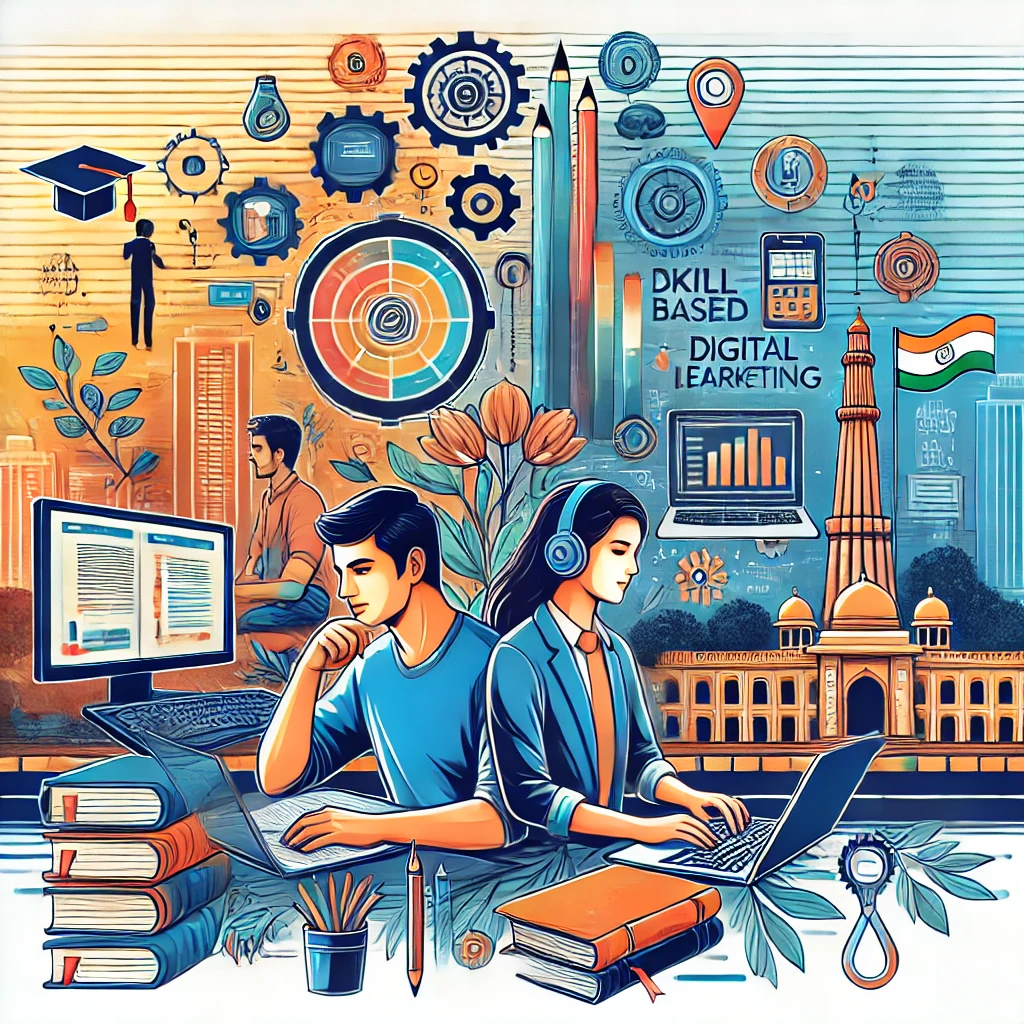When I was in school, I remember being told that memorizing facts and scoring high marks were the keys to success. We spent hours learning formulas, historical dates, and grammatical rules, only to regurgitate them during exams. Little did I know then that this approach, though well-intentioned, was preparing me for a world that no longer existed. Fast forward to today, and it’s clear that the traditional education model that shaped so many of us is increasingly out of step with the demands of the modern workforce. This realization is both daunting and exciting, as it opens the door to new possibilities—especially through skill-based learning.

1. Introduction: The Need for Educational Reform in India
India’s educational landscape is ripe for change. For too long, our system has placed undue emphasis on rote learning, where students are expected to memorize information without truly understanding it. This approach, while effective in producing high exam scores, often leaves students unprepared for the real world, where practical skills and critical thinking are paramount. As someone who has witnessed this gap firsthand, I can’t help but feel a sense of urgency for reform. We need to shift our focus towards skill-based learning, an approach that not only equips students with the tools they need for success but also aligns education with the ever-evolving demands of the job market.
2. The Growing Gap Between Education and Employability
Did you know that only about 48.7% of Indian graduates are considered employable? This statistic from the 2022 India Skills Report paints a stark picture of the disconnect between education and the job market. It’s alarming to think that nearly half of our graduates lack the skills needed to secure a job in their chosen fields. The traditional education system, with its emphasis on theoretical knowledge, has not kept pace with the practical skills required by employers today.
But why is this the case? The problem lies in the outdated curricula that fail to incorporate the skills that are in demand. Employers today are looking for candidates who can think critically, solve complex problems, and adapt to new challenges—skills that are often overlooked in traditional education. This is where skill-based learning comes into play. By focusing on the development of practical skills, we can bridge this gap and ensure that our graduates are not just employable, but also equipped to thrive in their careers.
3. Understanding the Different Types of Skills Students Need
Let’s talk about the kinds of skills that really matter in today’s world. Skill-based learning isn’t just about teaching students how to use a specific tool or software; it’s about cultivating a broad range of competencies that prepare them for life beyond the classroom. These skills can be categorized into four main types:
- Technical Skills: Think about the rise of technology in every industry. Whether it’s coding, data analysis, or digital marketing, technical skills are increasingly important. For example, consider the booming IT sector in India, which is projected to create around 2 million new jobs by 2025. These jobs will require advanced technical skills, something that traditional education doesn’t always emphasize.
- Vocational Skills: These are the hands-on skills that are crucial in specific industries. Imagine a young person from a rural area learning carpentry or plumbing—skills that can directly lead to employment and income generation. The National Skill Development Corporation (NSDC) has found that skill training in rural areas can lead to a 12-15% increase in household income, making a significant difference in the lives of these families.
- Soft Skills: While technical skills get a lot of attention, soft skills are just as important. Communication, teamwork, leadership, and emotional intelligence are crucial for navigating the workplace. These skills help individuals work effectively with others and adapt to different environments—qualities that are invaluable in any job.
- Life Skills: These are the skills that help individuals manage everyday life, such as financial literacy, time management, and problem-solving. Life skills contribute to a person’s overall well-being and adaptability, making them better equipped to handle the challenges that come their way.
4. Skill Development as a Catalyst for Economic and Social Growth
The benefits of skill-based learning extend beyond individual success; they have far-reaching implications for the economy and society as a whole. Let’s take a closer look at the impact. In rural areas, where job opportunities are often scarce, skill development can be a game-changer. The NSDC’s findings on increased household income through skill training are a testament to the potential of this approach to uplift entire communities.
On a larger scale, India’s growing economy is hungry for skilled workers. With urbanization on the rise, there is a growing demand for workers with the right mix of skills to drive industries forward. The IT sector is a prime example, with millions of jobs expected to be created in the coming years. However, these opportunities can only be seized if our workforce is adequately prepared.
Moreover, skill-based learning isn’t just about filling jobs—it’s about fostering innovation and entrepreneurship. When individuals have the skills to think critically and solve problems creatively, they are more likely to start businesses, create jobs, and contribute to economic growth. This is particularly important in a country like India, where the potential for entrepreneurship is vast, but often untapped due to a lack of relevant skills.
5. The Role of Innovation and Entrepreneurship in Modern Education
Speaking of entrepreneurship, let’s not forget how skill-based learning can spark innovation. I’ve seen firsthand how students who are encouraged to think outside the box and apply their skills in new ways often come up with creative solutions to everyday problems. This entrepreneurial mindset is exactly what we need in today’s fast-paced, technology-driven world.
Consider the fact that enrollments in skill-based courses in India grew by 47% from 2021 to 2023. This surge in interest reflects a growing recognition of the importance of these skills in the job market. Many of these courses focus on areas like digital marketing, coding, and data analysis—fields that are ripe for entrepreneurial ventures. With the right skills, today’s students can become tomorrow’s innovators, creating businesses that not only succeed but also drive economic growth.
Government initiatives like Skill India and Startup India are also playing a crucial role in this transformation. By providing resources, mentorship, and support, these programs are helping to nurture the next generation of entrepreneurs. The result? A more dynamic, innovative economy that is better equipped to compete on the global stage.
6. Integrating Skill-Based Learning in Indian Schools: Challenges and Solutions
Of course, integrating skill-based learning into the education system isn’t without its challenges. Schools often struggle with outdated curricula, limited resources, and a lack of trained teachers. But these challenges, while significant, are not insurmountable.
One of the most important steps we can take is to redesign the curriculum to include skill-based learning from an early age. This doesn’t just mean adding new subjects; it means changing the way we teach existing ones. For example, project-based learning, where students work on real-world problems, can help them develop practical skills while still covering academic content.
Partnerships with industries can also play a crucial role. By collaborating with local businesses, schools can provide students with hands-on experience through internships and apprenticeships. These experiences not only give students a taste of the working world but also help them apply their skills in practical settings.
Teacher training is another critical factor. Educators need to be equipped with the knowledge and tools to teach these skills effectively. Continuous professional development and access to modern teaching resources can help teachers stay updated with the latest industry trends and educational practices.
7. The Future of Skill-Based Learning in India
As we look to the future, it’s clear that the role of skill-based learning will only become more important. Currently, India ranks 72nd out of 140 nations in terms of the skill sets of its graduates, according to the World Economic Forum. This ranking highlights the need for continuous improvement in our education system.
The future of education is likely to see an increased reliance on technology. Online learning platforms, coding boot camps, and vocational training programs are already playing a central role in education. These platforms offer flexible, accessible learning opportunities that can be tailored to individual needs, making it easier for students to acquire new skills throughout their lives.
But it’s not just about technology. As industries evolve, so too must the skills we teach. The rise of artificial intelligence, automation, and digital transformation will create new job roles that require specialized skills. By staying ahead of these trends, India can ensure that its workforce remains competitive on the global stage.
8. Conclusion: A Call to Action for Building a Skilled Nation
As I reflect on the role of skill-based learning in India, I can’t help but feel a sense of optimism. The challenges we face are significant, but the opportunities are even greater. By embracing skill-based learning, we can bridge the gap between education and employment, foster innovation and entrepreneurship, and drive economic growth.
At Skillera, we’re committed to supporting this transition. We believe that every Indian student deserves the opportunity to develop the skills they need to succeed. But we can’t do it alone. We need the support of educators, policymakers, parents, and students to make skill-based learning a priority in our education system.
So, what can you do? Start by exploring the resources available at Skillera. Whether you’re a student looking to build new skills, a parent seeking to support your child’s education, or an educator eager to bring skill-based learning into your classroom, there’s something for everyone. Together, we can build a skilled, adaptable workforce that’s ready to meet the challenges of the 21st century.
Let’s work together to ensure that every Indian student has the opportunity to develop the skills they need to thrive in the modern world. The time for change is now, and it starts with us.


